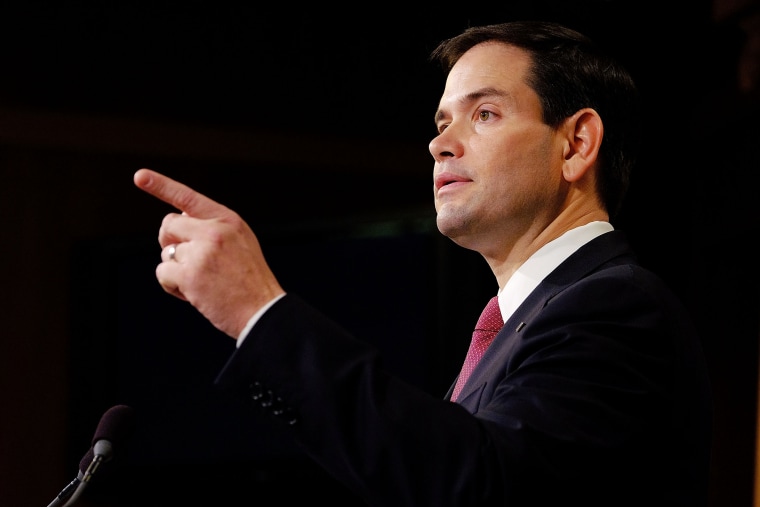If last year's midterm elections were defined by anything, it was fear. In the closing weeks of the cycle, Republicans did everything they could to scare the bejesus out of voters, telling Americans to be terrified of ISIS terrorists, Ebola, and quite possibly ISIS terrorists with Ebola.
The politics of fear prevailed and Republican candidates had a terrific year at the ballot box. It's a lesson Sen. Marco Rubio (R-Fla.) may be taking a little too seriously.
The New Republic's Jeet Heer explained yesterday the degree to which Rubio "wants to scare Americans into voting for him."
[Monday], Marco Rubio announced the new theme of his campaign: "The fundamental problem we have in America is that nothing matters if we aren't safe." According to Rubio, "The world has never been more dangerous than it is today," which means "the economic stuff" has to take a backseat to national security. [...] This black-and-white language negates the possibility that security is one value among others, that it needs to be balanced against competing values such as liberty or peace. It's hard to imagine cruder appeals to fear. And by appealing to fear in the name of security, they only ensure they'll get less of what they say they want.
Part of the challenge for Rubio is overcoming his general distaste for policy depth, especially in areas of national security. The Florida Republican has a great affinity for catchphrases and over-simplified principles, which frequently generate applause from far-right audiences feasting on red meat, but which often makes it seem as if the senator has no idea what he's talking about.
Last week, for example, Rubio declared "our strategy" on national security should mirror Liam Neeson's catchphrase in the film "Taken": "We will look for you, we will find you and we will kill you."
Soon after, the candidate's team unveiled the "Rubio Doctrine," described by Charles Pierce as "three banalities strung together in such a way as to sound profound and to say nothing."
If a national campaign for the White House were an elaborate test to identify which candidate is best as sloganeering, Rubio would have an excellent chance at success. But there is -- or at least should be -- a little more to it.
At its core, Rubio's message is as vacuous as anything we've seen in a while. "Nothing matters if we aren't safe"? That's a pretty radical proposition on its own, but just as important is the fact the far-right senator hasn't presented any kind of meaningful strategy that would improve our security, aside from shallow rhetoric about "toughness" and "strength."
Indeed, Rubio seems to operate from the assumption that wars and military offensives will, practically by definition, generate "safety" -- a posture most of us already know to be wrong.
"The world has never been more dangerous than it is today"? That's absurd. By historical standards, the world is actually less dangerous. Jon Chait called the argument "insanely wrong," adding, "How about when a massive communist empire threatened us with nuclear annihilation? Or when Nazi Germany and Imperial Japan launched a war of extermination? Or when the Mongols amassed the largest land conquest in human history and left behind smoking ruins and pyramids of skulls?"
Don't bother Marco with details; he has a campaign to run.
